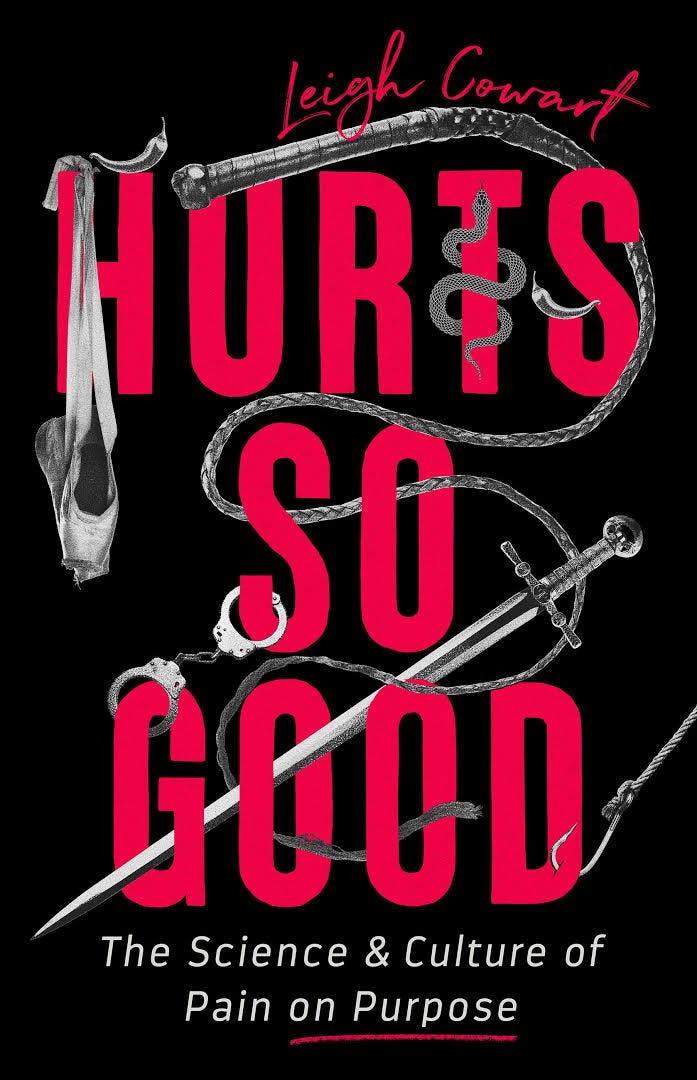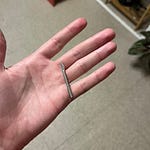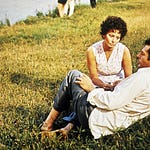
The only good male dominant I’ve ever played with for free was a blond bisexual switch who kept company with beautiful fags of all birth assignments. Aaron1 was easy to talk to and easier to bottom to, especially considering that he was a white cis guy.
Maybe Aaron didn’t feel like he had anything to prove. In his late twenties, he was several years older than I, dating two gorgeous men, and one of the first people I ever played with who wasn’t also a beginner. Unlike me, he had known about and embraced his sexuality since childhood. His first perverted memory was from back in elementary school, when he got hard while wrapping himself up in an electrical cord. It was, he said with a smile acknowledging his joke’s corniness, like a lightbulb turning on.
Charmed, I started asking other players I knew about their kinky a-ha moment. Only a few years gay at that point, I was sick of other homos’ depressing coming out stories2 (not to mention my own); of that inevitable moment early in any new relationship with another queer person when you would have to revisit the self-loathing, the fear, the confusion, the betrayal of family and friends. While these coming-to-kink stories weren’t always positive—and many of them mirrored or appended queer and trans coming out stories, because there once was a time, not so long ago, when a perv was a perv all the way down the line—I hadn’t yet come to a political understanding of myself as a leatherdyke, so my burgeoning interest in getting beat up by hot people still felt distinct from my interest in gay sex. Newer to me, conceptually speaking, than sodomy, kinky felt like more of a nut to crack than gay, which felt like it had cracked me. In both cases, however, I was still preoccupied with my difference from my natal family and culture, still asking myself, Why am I like this?
I thought about Aaron while reading Leigh Cowart’s delightful Hurts So Good: The Science & Culture of Pain on Purpose. Early in the book—part science journalism and part ethnography, with a just taste of memoir—as they recount their formative experiences as a young dancer, Leigh poses that same question:
Did ballet make me a masochist? Or was I simply well suited to the grueling discipline of the art form because of something intrinsic to my core personality, the nebulous you-ness that becomes solid and nameable by kindergarten? (Two things can be true at once, and my guts tell me that the answer to both of these questions is yes.)
Unlike I was back when I was sleeping with Aaron, Leigh is not expecting a single answer to their question, an approach I understand now that I’m a mature gay person and, if I may be so bold, a student of pain.
But I am not a scholar of pain, a scientist of pain, or, like Leigh, a journalist of pain. Briskly interweaving history, biology, and reportage, Hurts showcases the expertise of not only doctors and scientists, but pain experts of all types—ballerinas, Muay Thai fighters, perverts, competitive pepper eaters, hook-suspension enthusiasts—resisting the medicalization of masochism and its associated sexual subcultures for a more holistic understanding of why and how “using pain for its own sake is an everyday part of being human,” as Leigh puts it (and has been since time immemorial across cultures all over the world). Combining what hard data we have available (though never without a critique of the many biases such studies tend to drag along with them), trawling strip malls, fairgrounds, and gyms, they’re able to ask, Why am I like this? without the constraints the search for a defining answer imposes. A masochist themself, Leigh seeks a better and broader understanding of masochism rather than a solution for it, in defiance of mainstream approaches to difference that are more interested in tracking down the “gay gene,” the trans disease, the black mental illness—thereby reinforcing the structures that birth and then destroy such difference—than they are with understanding the systems within with they exist. The critical but undoubtedly harm reductionist bent to Leigh’s survey of cutters, addicts, disordered eaters, Jesus freaks, pervs, perfectionists, and other masochistic types, and those who love them, put me at ease right away; while a part of Leigh’s agenda is expanding what we mean when we say masochist, I wonder that a non-masochist could have done it so well.
Such an approach undermines the pain/pleasure binary at the root. “It seems counterintuitive: although our experience of pain feels immediate and straightforward, it is nothing like flipping a switch,” writes Leigh. “What makes pain so interesting to study,” says one of their sources, neuroscientist Jans Foell, “is that pain itself is really one hundred percent subjective.” Like sex, the body, and desire, the experience of pain is circumstantial and contextual, making it a rich site of study for anyone who wants to know why from angles other than the ones in which we’re so violently inculcated. Though pleasure is not their explicit quarry here, Leigh’s exploded view of pain is an essential component of the excavation of pleasure for which we’re long overdue. In American culture, pleasure is inherently sexualized and viewed with suspicion, and yet even when we get away from the moralizing (and moral panics), we can’t agree about pleasure’s familiars, from consent and responsibility to risk and harm.
While I think Leigh’s project aligns with mine, what I probably won’t be able to do for you here on DAVID is provide a mini bio of Leopold von Sacher-Masoch, or explain why male platypus venom is so dangerous, or recount the blackout-inducing suffering of standing en pointe, or explain how a nociceptor works, or walk you through the excruciating lows—and highs—of an ultramarathon. But Hurt does, and for that reason alone I recommend it. Courageous, diverting, and written with dark good humor, Leigh’s first book has left me looking forward to the next. Maybe that one will be about pleasure? We can only hope.
David tweets at @k8bushofficial. Read the earthquake room. Keep reading DAVID to find out when their second novel, X (Catapult, 2022), is available for preorder.
Subscribe to support GOOD ADVICE/BAD GAY, an advice series from an anonymous gay therapist who’s not afraid to hurt your feelings with the truth. (Sample an unlocked post for a taste of what you’re missing.) 100% of funds go to support a rotating selection of mutual aid and reparations projects.
Want advice? Email badgayadvice@gmail.com for a free 3-month subscription.
Obviously not his real name.
I mean this in a broad way. Many people are never “in” to begin with. The “coming out conversation,” in my experience, encompasses all queer and trans stories of origin and becoming.











